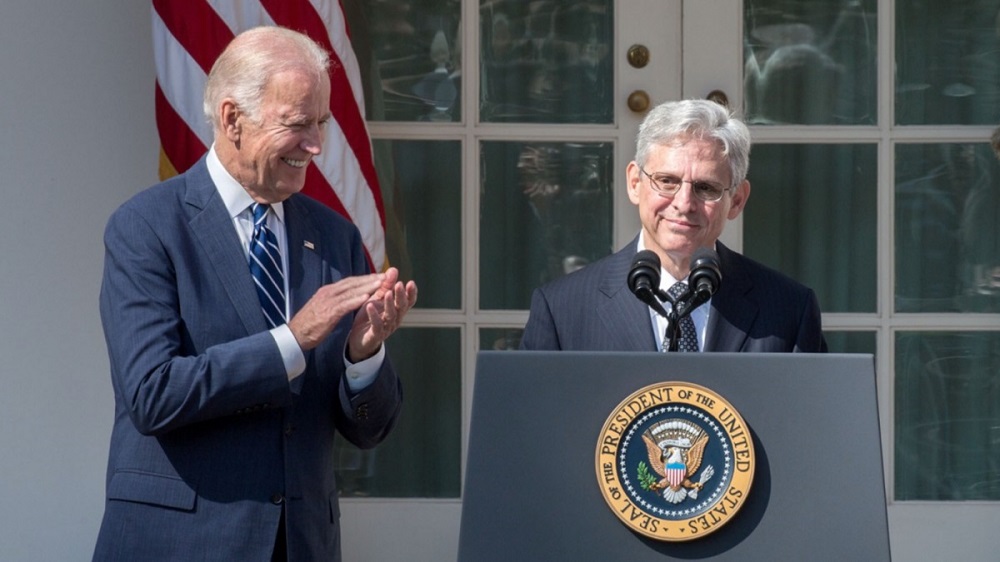
OPINION: This article contains commentary which may reflect the author’s opinion
A July filing about a lawsuit against the Department of Justice reveals that the nation’s top law enforcement agency has been dragging its feet and refusing to discuss its potential problems with conflict of interest and bias in policing important matters that expose the President’s connection to a number of criminal issues.
Of top concern is the problematic relationship between Hunter Biden, the son of President Joe Biden, and the contents of Hunter’s laptop and phone that could implicate other members of the Biden family, including Joe Biden, in massive crimes.
The Biden agency has refused to address a Freedom of Information Act (FOIA) regarding the release of records to a citizen’s watchdog group that might be damaging to Democrat Joe Biden and his son Hunter Biden.
The watchdog group claims to want to restore trust in the government and is being ignored by the Biden administration so far.
“Plaintiff Protect the Public’s Trust brings this action against the U.S. Department of Justice under the Freedom of Information Act, 5 U.S.C. § 552 (“FOIA”), and the Declaratory Judgement Act, 28 U.S.C. §§ 2201 and 2202, seeking declaratory and injunctive relief to compel compliance with the requirements of FOIA,” the lawsuit opens up declaring.
According to the filing, after a full year, the DOJ under Attorney General Merrick Garland has refused to address the FOIA request and won’t discuss whether or not they will even comply at any time:
“On June 1, 2021, PPT submitted a FOIA request to the Department seeking the following records from the Department’s Justice Management Division (“JMD”): From November 23, 2020 through the date this request is processed, all waivers, impartiality determinations, or any other guidance issued to political
appointees of the Biden Administration, exempting them from any part of their obligations as defined in relevant laws, regulations, rules, and/or the Biden Administration’s Ethics Pledge. This request also includes any records and communications between employees of the JMD, as well as any records and communications between the JMD and any political appointees regarding waivers or impartiality determinations.”
According to a press release from the group:
While urging transparent and timely disclosure to other agencies, Justice refuses to provide documents about waivers to ethics rules
Today, watchdog Protect the Public’s Trust announced a federal transparency lawsuit against the Department of Justice (DOJ) for DOJ’s refusal to comply with requests for records regarding waivers to federal ethics laws and potential conflicts of interest among high-level staff. Media reports and publicly available documents indicate the potential for bias or conflicts of interest among several officials with respect to high-profile cases, such as the Hunter Biden and Durham investigations and an upcoming Supreme Court case that could affect affirmative action in higher education.
The Biden administration “has filled some of the highest ranks of DOJ with officials who have been criticized for possible bias or potential conflicts of interest in high-profile cases,” Protect the Public’s Trust alleged in a press release, citing media reports and public documents.
The high-profile cases include the reported federal financial crimes investigation of Hunter Biden and Special Counsel John Durham’s probe into the origins of the discredited Trump-Russia collusion investigation.
“The President appointed Nicholas McQuaid as Principal Deputy Assistant Attorney General in the Criminal Division,” according to PPT. “Just prior to the Administration taking power, a former colleague of McQuaid, with whom McQuaid jointly represented at least one client, was hired by Hunter Biden, who is reportedly ‘under investigation for possible tax and money laundering activities, with a potential counterintelligence component.’”
Susan Hennessee, meanwhile, who previously disparaged the Durham investigation as “partisan silliness,” was appointed general counsel in the DOJ’s National Security Division, the watchdog added.
“Have these officials been granted waivers to participate in these matters, which would likely fall into their portfolios?” asks PPT. “Over a year ago, PPT submitted a Freedom of Information Act (FOIA) request to DOJ seeking ethics waivers and documents that could help shed light on whether these officials were given the green light to participate in these matters. By its refusal to properly respond to this FOIA request, as required by law, DOJ is hiding this information from the American public.”
Three other DOJ appointees — Jonathan Kanter, Rachael Rollins, and Solicitor General Elizabeth Prelogar — declared on their ethics certificates that they received waivers from participating in matters in which they may have conflicts of interest. However, the DOJ has yet to release the waivers, according to PPT.
“During Transparency Week, Attorney General Merrick Garland made a strong case for the importance of FOIA in ‘ensuring transparency, accessibility, and accountability in government,’” said PPT Director Michael Chamberlain. “But even where serious concerns about bias, impartiality, and conflicts of interest in his own agency could be alleviated with a little transparency, Protect the Public’s Trust has run into a stonewall. It’s little wonder trust in the government continues to decline,” the press release reported.
Protect the Public’s Trust closed their filing by respectfully requesting the Court to do the following:
(1) Assume jurisdiction in this matter, and maintain jurisdiction until the Department
complies with the requirements of FOIA and any and all orders of this Court.
(2) Order Defendant to produce, within ten days of the Court’s order, or by other such
date as the Court deems appropriate, any and all non-exempt records responsive to
PPT’s FOIA request and indexes justifying the withholding of all or part of any
responsive records withheld under claim of exemption.
(3) Enjoin the Defendant from continuing to withhold any and all non-exempt responsive
Source: The Republic Brief